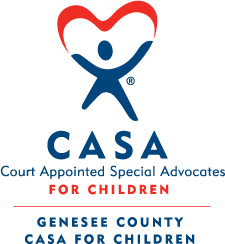How are CASA/GAL volunteers different than social workers, attorneys and others working with children in court?
CASA/GAL volunteers are assigned to only one or two children or sibling groups at a time.
Our volunteers stay involved on the case from the time of appointment until the child achieves permanency.
Because of the small number of children a volunteer serves, they have more time to commit to each child.
CASA/GAL volunteers are specially trained to consider issues relevant to the best interests of the child, which may be different than the interests of other parties or the child’s wishes. Traditional attorneys who represent children are required to advocate for their client’s—the child’s—wishes.
Evidence of Effectiveness
A child with a CASA volunteer is more likely to find a safe, permanent home:
More likely to be adopted
Half as likely to re-enter foster care
Substantially less likely to spend time in long-term foster care
More likely to have a plan for permanency
Children with CASA volunteers get more help while in the system...
More services ordered for the children
Children with CASA volunteers are more likely to have a consistent, responsible adult presence
Volunteers spend significantly more time with the child than a paid guardian ad litem
Children with CASA volunteers spend less time in foster care and are less likely to be bounced from home to home. CASA volunteers...
Improve representation of children
Reduce the time needed by lawyers
Are more likely than paid lawyers to file written reports
Are highly effective in having their recommendations adopted by the court
Children with CASA volunteers do better in school...
More likely to pass all courses
More likely to receive quality educational services
Less likely to have poor conduct in school
Less likely to be expelled
...and score better on nine protective factors:
Neighborhood resources
Interested adults
Sense of acceptance
Controls against deviate behavior
Models conventional behavior
Positive attitude towards the future
Valuing achievement
Ability to work with others
Ability to work out conflicts

